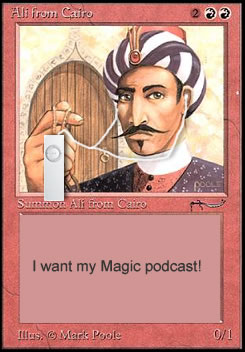
by Ron Vitale
I’ve been playing Magic for over 11 years now and I’ve read “The Duelist,” “Scrye,” “Inquest,” StarCity Games articles, and Magicthegathering.com, just to name a few. But you know what? We Magic players are behind the times. We need something new and exciting to help the hobby advance to the next level. But don’t panic, I have a solution.
Think about what it might have been like to watch color television for the first time. Or think back to the first time you surfed the Internet using a broadband service. Magic content has been flat for over 11 years now and it’s time that articles evolve and transform into the next big thing. What do I mean? Well, let me ask you this question: Why isn’t there a Magic: The Gathering podcast? (I've since learned that there is a Magic podcast at Brainburst.com entitled "TCG Player Radio" but it's not well advertised and, although a valiant effort, has some problems. I'll talk more about that later.)
For the uninitiated, Wikipedia defines pocasting as “a way of publishing sound files to the Internet, allowing users to subscribe to a feed and receive new audio files automatically. Podcasting is distinctive from other types of audio content delivery by its use of the RSS protocol. This technique has enabled a number of individuals to create self-published, syndicated radio shows.” To break this definition down into layman’s terms: A podcast (nicknamed after an iPod) is an mp3 audio file that you can play on your PC or on a portable mp3 player. (If you want a longer history of what podcasting is, click here )

I’ve done the research and am putting this information out on the Web for all you Magic fans out there. I challenge you to come up with a Magic: The Gathering podcast. But I’m going to help you along the way. I don’t have the time to create a show, but I can share my knowledge. I believe that together we can transform the way we receive Magic content.
Why Do We Need a Magic Podcast?
We’ve seen webcasts of Worlds and other tournaments from Wizards of the Coast. Having worked with vendors on webcasting, I know how expensive taping an event can be. The beauty of podcasting is that anyone with a little know-how and a few pieces of equipment can put together a podcast and share the recording with the masses. The cost is extremely cheap. Before I get into the details, let’s talk about some Magic podcast ideas:
- Sound seeing tours: What are they? Well, imagine if a person takes a portable recorder and a microphone with him, goes on a trip somewhere, and starts recording a show. Some famous sound seeing tours are of people visiting Target, a strip club, and the lobby of the Waldorf hotel in New York City. Imagine a podcast from Worlds in which the creator of the show interviewed the top players, spoke to the judges, and talked with attendees of the tournament. And forget Worlds, what about podcasts from any other Pro Tour Qualifer? The simplicity of making the podcast allows you to be anywhere (without a lot of bulky equipment). A podcaster could do a show from a Magic tournament at GenCon or at Wizard World. Remember, with a little imagination, the location can be anywhere on the planet. Why not conventions? Having attended a few over the years, I’ve learned that many Magic artists are there and this environment would be a great setting to interview them for a portion of a show. Again, the possibilities are limitless.
- Utilize technology to interview other players from around the world. With the Skype software (a mixture between an instant messenger and a telephone), you can call people anywhere in the world via the Internet and have a great quality connection. A podcaster can call up one of the top players from a recent tour, do a phone interview, and record the conversation and there’s a podcast.
- Weekly discussions on rulings, the metagame, drafting techniques, and other card strategy. If a person is creative enough, a show that dealt with these topics could be fun to listen to. Combine the podcast with “show” notes on a Website and you could include visuals (screenshots of a playing board from a MWS or MODO game) or links to other sites.
- Podcast a pre-release. Interview newbies at a release and talk about the new set, what cards people like, what they think the chase rares will be, and what type of decks they’ve decided to use.
In just a few minutes, I was able to dream up the above ideas and I think you’ll agree that some of them would make really fun podcasts. With a little brainstorming and some help from the Magic community, I can easily see how a weekly Magic podcast could be started.
We Have the Technology
Let’s talk about the listeners first. If you want to listen to a podcast, what do you need to do? Well, there are several podcast aggregators out there. Take the time to check them out. To simplify matters, I use iPodder. I’m not endorsing iPodder, but it’s easy to set up, use, and that’s what matters most. But what does iPodder do? Once the software is installed, you can take a RSS feed of a podcast, add it to iPodder, and then either manually or schedule iPodder to check the Web to see if new podcasts are available. If one is available, iPodder will download the mp3 of the podcast, save it to your computer, and if you want transfer it to your iPod. If you don’t own an iPod, listen to the mp3 on your computer or on another mp3 player. It’s as simple as that and it’s free.

- theForce.net RSS feed: http://feeds.feedburner.com/tfn
- Catholic Insider (don’t knock it, last month it was the number one podcast) RSS feed: http://feeds.feedburner.com/catholicinsider
- Daily Source Code RSS feed: http://radio.weblogs.com Former VJ of MTV Adam Curry, the father of podcasting, has his own show.
There are over 4,000 different podcasts out there so take some time to check them out at Podcast Alley.
Making It Happen
Are you juiced up and want to work with others to make a Magic: The Gathering podcast? You can do one or two things:
- Just start making one without doing your homework and it’s going to suck.
- Take the time to listen to other podcasts (especially the ones that are highly ranked on Podcast Alley and learn WHY these shows are popular.
I suggest that a group of people work together on putting together a Magic podcast. Here’s an excellent opportunity for all the Magic websites out there to really put some excellent content together. But be smart: Add some music to the show, make sure you know what you’re going to talk about in advance, and have the show be dynamic. Again, I’d highly suggest that you listen to several popular podcasts to see what they do right.
To start off, you could listen to Brainburst.com's TCG Player Radio. As I've mentioned above, the "radio" show is an excellent start, but there are several issues that need to be worked out. First off, there's hardly any advertising (that I could see) on Brainburst.com concerning the podcast. Branding it as "TCG Player Radio" also confuses matters, since it is a podcast and is even ranked on Podcast Alley (as of this writing it's the 84th ranked show). I applaud Brainburst.com for running the podcast, but the podcast is plagued with technical issues: RSS isn't set up so you can't use iPodder to download it automatically to your PC, there are consistent audio volume issues in two of the three shows I heard, and the most important point is that the podcast is extremely too long. Listening to two or three guys talk about Magic for 45 minutes is a bit overkill. Take into consideration that if you can't envision the cards they're talking about, you can't really follow along. Although TCG Player Radio plays an important role, I'd like to see them branch out more with doing smaller segments: 5 minutes on Standard, couple minutes on listener feedback, and 5 minutes on limited. To cap my suggestions off, show notes are a must. If you can't see the deck or at least have the opportunity to review a specific card or deck that they're talking about in the show notes, then some listeners will be lost in the dust. Again, I tip my hat to the team, but I believe that there are others who can help them increase their production value.
Equipment
Depending on how expensive you want to go, you can create a podcast very cheaply by simply using your PC’s sound card to record your podcast or you could invest in a good microphone and a portable mp3 player for those sound seeing tours.

If you want to work off your PC, you’ll also need a decent microphone, but you’ll also need some software to create your podcast. I’ve not used any of these programs, but if you muck about the podcast forums for a bit, I bet you’ll find out which of these is good to use for a novice.
After you create your podcast, you’ll need to set up a RSS feed so that all those users out there in Magic land can add your feed to their iPodder software. Here’s a list of two programs that allow you to create a RSS feed.
Finally, you’ll need a Website to host your audio files so that people can download the files via their iPodder software. This is where big sites like SCG and MTGSalvation can help out. They have the bandwidth and the Web space.
Now as you can tell from this long article, podcasting isn’t for the faint of heart. But if you have a desire to succeed and to break ground in a new territory, then take heed to what I’ve taught you here. Adam Curry’s podcast has approximately 80,000 listeners and it is estimated that over 5.4 million people in the United States listen to some form of podcasting. Not too shabby at all.
It’s not going to be easy, but it sure can be fun. Take that hunk of plastic and metal on your desk and do something more with it than just frag opponents in Doom3. The Magic world is in need of some new blood and this is it. Use what you’ve learned and apply your imagination and there will be no stopping you.
Resources:
*Thanks go to Iloveatogs for the banner he created.
Comments